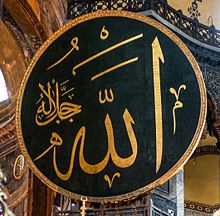Islam
Muslims believe that Islam is the complete and universal version of a primordial faith that was revealed many times before through prophets including Adam, Abraham, Moses and Jesus Muslims consider the Quran in its Arabic to be the unaltered and final revelation of God. Like other Abrahamic religions, Islam also teaches a final judgment with the righteous rewarded in paradise and unrighteous punished in hell.
Religious concepts and practices include the Five Pillars of Islam, which are obligatory acts of worship, and following Islamic law (sharia), which touches on virtually every aspect of life and society, from banking and welfare to women and the environment. The cities of Mecca, Medina and Jerusalem are home to the three holiest sites in Isla
Aside from the theological narrative, Islam is historically believed to have originated in the early 7th century CE in Mecca, and by the 8th century the extended from Iberia in the west to the Indus River in the east. The Islamic Golden Age refers to the period traditionally dated from the 8th century to the 13th century, during the Abbasid , when much of the historically Muslim world was experiencing a scientific, economic and cultural flourishing. The expansion of the Muslim world involved various such as the Ottoman Empire, trade and conversion to Islam by
Most Muslims are of one of two denominations; Sunni (75–90%)or Shia (10–20%).About 13% of Muslims live in Indonesia, the largest Muslim-majority country; 31% live in South Asia, the largest population of Muslims in the world; 20% in the Middle East–North Africa region where it is the dominant religion and 15% in
Muslims are the majority in Central Asiaand are also widespread in the and Southeast Asia India is the country with the largest Muslim population outside Muslim-majority countriesSizeable Muslim communities can also be found in the Americas, China, Europe, and Russia. Islam is the fastest-growing major religion in the world
Etymology and meaning
The Kaaba in Mecca is the direction of prayer and Muslim destination of pilgrimage
Islam was historically called Muhammadanism in Anglophone societies. This term has fallen out of use and is sometimes said to be offensive because it suggests that a human being rather than God is central to Muslims' religion, parallel to Buddha in Buddhism.[55] Some authors, however, continue to use the term Muhammadanism as a technical term for the religious system as opposed to the theological concept of Islam that exists within that system.[56]
Articles of faith
Faith (Iman) in the Islamic creed (Aqidah) is often represented as the six articles of faith, notably spelled out in the Hadith of Gabriel.
Medallion showing "Allah" (God) in Hagia Sophia, Istanbul, Turkey
Islam teaches that the creation of everything in the universe was brought into being by God's command as expressed by the wording, "Be, and it is"[63] and that the purpose of existence is to worship or to know God.[64][65] He is viewed as a personal god who responds whenever a person in need or distress calls him.[66] There are no intermediaries, such as clergy, to contact God who states, "I am nearer to him than (his) jugular vein."[67] God consciousness is referred to as Taqwa.
Allāh is traditionally seen as the personal name of God,[68] a term with no plural or gender being ascribed, and used by Muslims and Arabic-speaking Christians and Jews in reference to God, while ʾilāh (Arabic: إله) is a term used for a deity or a god in general.[69] Other non-Arab Muslims might use different names as much as Allah, for instance "Khodā" in Persian or "Ḵẖudā" in Urdu.
Angels

Muhammad receiving his first revelation from the angel Gabriel. From the manuscript Jami' al-tawarikh by Rashid-al-Din Hamadani, 1307, Ilkhanate period.
The Quran is the principal source for the Islamic concept of angels.[72] Some of them, such as Gabriel and Michael, are mentioned by name in the Quran, others are only referred to by their function. In hadith literature, angels are often assigned to only one specific phenomenon.[73] Angels play a significant role in Mi'raj literature, where Muhammad encounters several angels during his journey through the heavens.[74] Further angels have often been featured in Islamic eschatology, Islamic theology and Islamic philosophy.[75] Duties assigned to angels include, for example, communicating revelations from God, glorifying God, recording every person's actions, and taking a person's soul at the time of death.
In Islam, just like in Judaism and Christianity, angels are often represented in anthropomorphic forms combined with supernatural images, such as wings, being of great size or wearing heavenly articles.[76] The Quran describes them as "messengers with wings—two, or three, or four (pairs)..."[77] Common characteristics for angels are their missing needs for bodily desires, such as eating and drinking.[78] Their lack of affinity to material desires is also expressed by their creation from light: Angels of mercy are created from nur (cold light) in opposition to the angels of punishment created from nar (hot light).[79] Muslims do not generally share the perceptions of angelic pictorial depictions, such as those found in Western art.










.jpg)
.jpg)
0 komentar:
Post a Comment